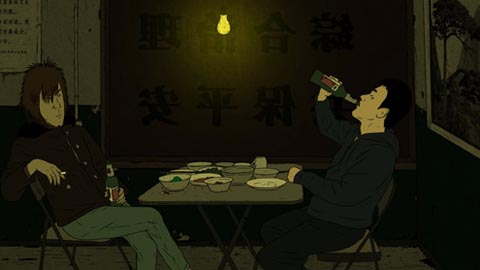

Is ‘Piercing 1’ the First Indie Animated Feature from China?
I found out Liu Jian’s Piercing 1 when looking through the list of winning films at the Portuguese animation festival Cinanima which ended a few days ago. After reading up on it, I’m fascinated by everything about the film and can’t wait to see it. I don’t know when that’ll be, but Los Angeles folks are lucky because the film has its US premiere on December 4 at the Silent Movie Theater.
The film tells a contemporary story set during the recent financial crisis. The synopsis:
Zhang Xiaojun came from a poor rural area to the big city. He put himself through university and found a job in a shoe factory. In 2008, the financial crisis forced the closure of many factories. Zhang Xiaojun lost his job. One day, a supermarket guard beats him up, mistaking him for a thief.
In vain, he asks the supermarket manager for financial redress — his dearest wish is to return to his village to resume a simple farming life. Right before his departure, the police arrest him. The supermarket manager also has his problems. On a moonlit night, the storylines converge in a teahouse near the city rampart.
The artwork for Piercing 1 looks beautifully drawn, and in this article about the film, Jian says that he drew the entire film himself on a WACOM tablet over the course of three years. “One day, I talked to my wife about the idea of making an animation film,” he said. “With her permission, we sold our apartment, relied on our savings and we also got help from our relatives. The whole combination of money needed to produce the film was USD $100,000.”
It should be noted that most (if not every) animated feature in China is made with some sort of funding or support from the government. Jian’s film is truly independent; in fact, the lack of the Chinese government’s oversight means that the film is unlikely to ever be released in that country. Hopefully he’ll find a way to distribute it internationally. When asked about the government’s reaction, Jian said:
“I’ve gotten a mixed reaction. The film deals with a lot of negative aspects of life. Even though these aren’t China-specific, government censors are always sensitive. It seems that they’re happy that a Chinese film is gaining international acclaim, but at the same time, with the negative themes in the movie… right now they’re not doing anything to block the film, but they’re not doing anything to promote it, either.”
More information about the film can be found at its official website. If you’ve already seen it on the festival circuit, please share your thoughts in the comments.
UPDATE: This review of the film by Thierry Meranger appeared in Cahiers du Cinéma.

